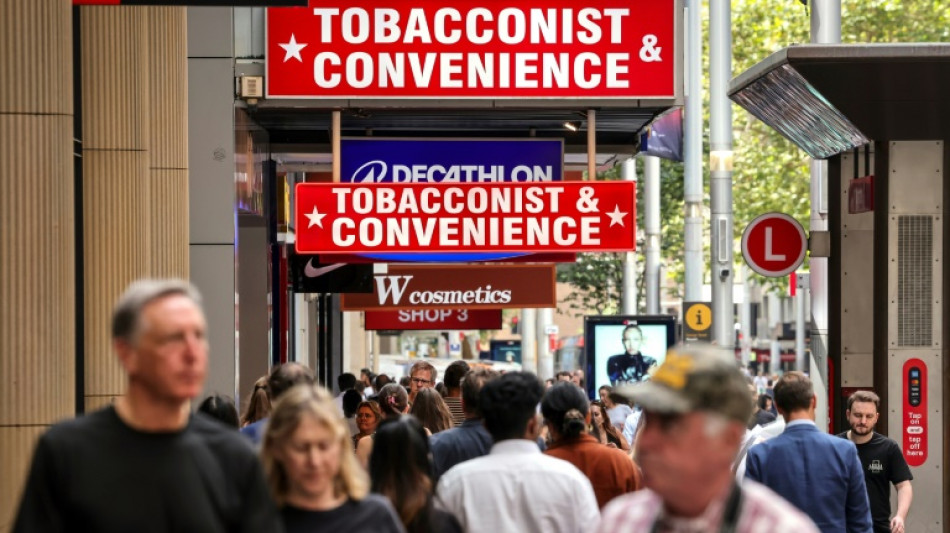
-
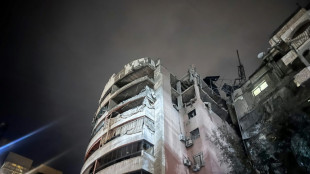 Hezbollah official targeted in deadly Israeli strike on Beirut
Hezbollah official targeted in deadly Israeli strike on Beirut
-
Israel PM drops security chief nominee under fire from Trump ally
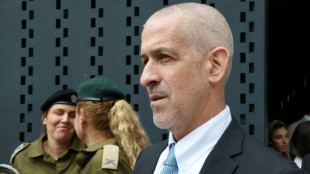
-
 Stock markets edge up but Trump tariff fears dampen mood
Stock markets edge up but Trump tariff fears dampen mood
-
South Korea court to rule Friday on president impeachment
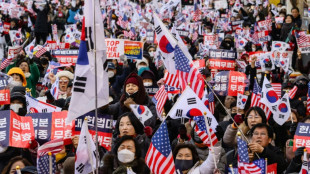
-
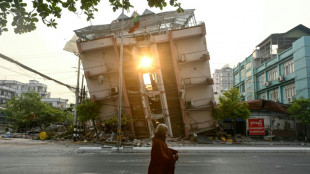 'Can collapse anytime': Mandalay quake victims seek respite outdoors
'Can collapse anytime': Mandalay quake victims seek respite outdoors
-
Stock markets edge back but Trump tariff fears dampen mood

-
 Myanmar holds minute of silence for more than 2,000 quake dead
Myanmar holds minute of silence for more than 2,000 quake dead
-
Kenya president still handing cash to churches despite his own ban
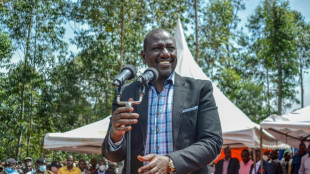
-
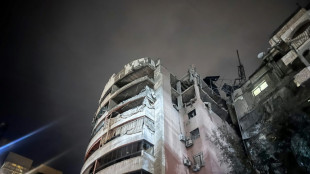 Israeli strike on Beirut kills three
Israeli strike on Beirut kills three
-
Russia-born Kasatkina says 'didn't have much choice' after Australia switch

-
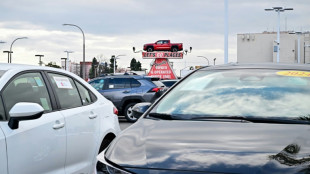 Carmakers face doubts and jolts over US tariffs
Carmakers face doubts and jolts over US tariffs
-
China holds large-scale military drills around Taiwan
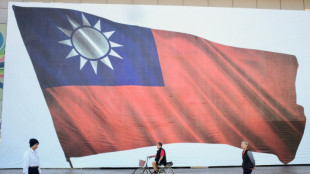
-
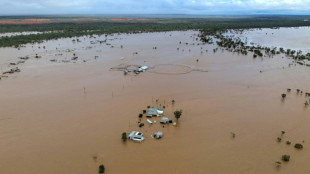 'Heartbreaking' floods swamp Australia's cattle country
'Heartbreaking' floods swamp Australia's cattle country
-
South Korean baseball put on hold after fan killed at stadium

-
 Celtics, Thunder power toward NBA playoffs, Lakers shoot down Rockets
Celtics, Thunder power toward NBA playoffs, Lakers shoot down Rockets
-
French prosecutors demand Volkswagen face fresh Dieselgate trial
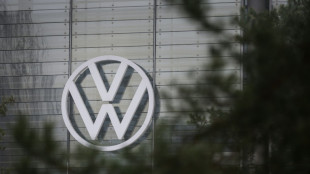
-
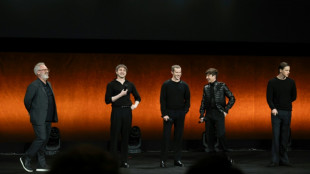 Sam Mendes to launch four 'Beatles' movies in same month
Sam Mendes to launch four 'Beatles' movies in same month
-
Battery boom drives Bangladesh lead poisoning epidemic
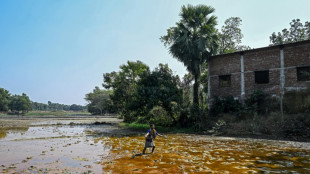
-
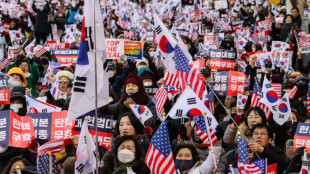 South Korea president impeachment ruling Friday: court
South Korea president impeachment ruling Friday: court
-
Israel strikes Hezbollah operative in Beirut, kills 3
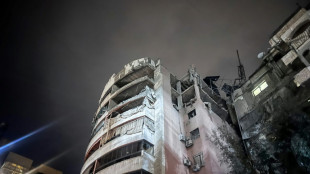
-
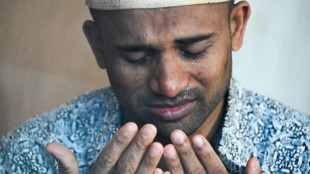 Desperate Rohingya mark Eid in Indonesia limbo
Desperate Rohingya mark Eid in Indonesia limbo
-
Sam Kerr has 'full support' of Australia squad, vice-captain says

-
 Asian markets edge back but Trump tariff fears dampen mood
Asian markets edge back but Trump tariff fears dampen mood
-
Teenage opener Konstas gets Australia contract with Ashes on horizon
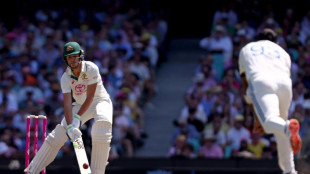
-
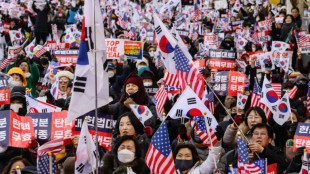 S. Korea court to rule Friday on President Yoon impeachment
S. Korea court to rule Friday on President Yoon impeachment
-
Myanmar to hold minute of silence for more than 2,000 quake dead

-
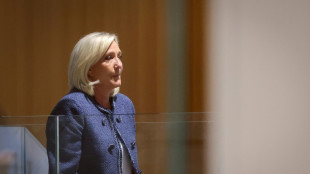 Far-right leaders rally around France's Le Pen after poll ban
Far-right leaders rally around France's Le Pen after poll ban
-
SpaceX launches private astronauts on first crewed polar orbit

-
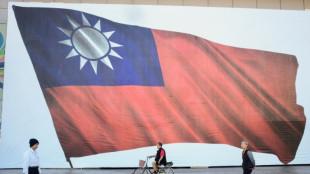 China launches military drills around Taiwan
China launches military drills around Taiwan
-
Political support leading to increasing fallout for crypto

-
 France's Le Pen seeks to keep presidency hopes alive after election ban
France's Le Pen seeks to keep presidency hopes alive after election ban
-
Trump tariffs threaten Latin American steel industry
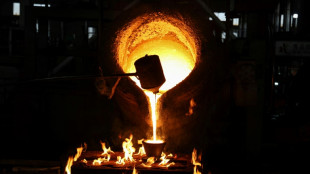
-
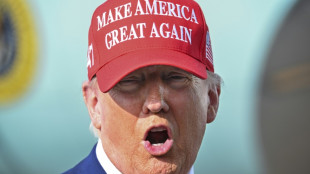 'Tariff man': Trump's long history with trade wars
'Tariff man': Trump's long history with trade wars
-
Tariffs: Economic 'liberation' or straitjacket?
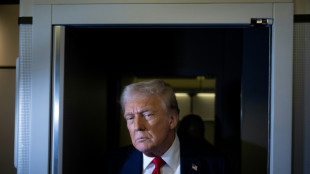
-
 Undocumented migrants turn to Whatsapp to stay ahead of US raids
Undocumented migrants turn to Whatsapp to stay ahead of US raids
-
What next for Venezuela as Trump goes after oil revenues?
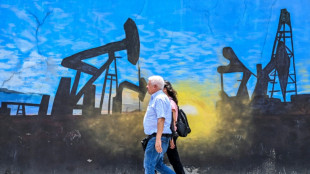
-
 New Zealand Rugby and Ineos settle sponsorship dispute
New Zealand Rugby and Ineos settle sponsorship dispute
-
China says launches military exercises around Taiwan
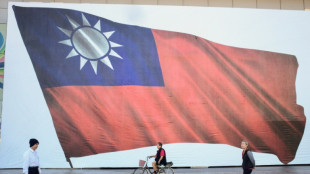
-
 Team New Zealand fails in bid to host 2027 America's Cup
Team New Zealand fails in bid to host 2027 America's Cup
-
DEA’s Marijuana Legal Blunder and Loss: MMJ Serves Up an April Fools ‘Gift’ a Gut Punch LawSuit for Irreparable Harm

-
 iSON Xperiences Appoints Ricardo Langwieder as Global Chief Sales Officer to Drive Growth and Innovation
iSON Xperiences Appoints Ricardo Langwieder as Global Chief Sales Officer to Drive Growth and Innovation
-
Zeus North America Mining Corp. Defines High-Priority Drill Targets at Cuddy Mountain

-
 Fluent Bit v4 Released: Transforming Telemetry Data Management
Fluent Bit v4 Released: Transforming Telemetry Data Management
-
Helium One Global Ltd Announces Jackson-4 Flow Testing and Gas Sampling Analysis

-
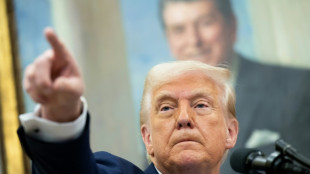 Trump says will be 'kind' with tariffs as deadline looms
Trump says will be 'kind' with tariffs as deadline looms
-
OpenAI says it raised $40 bn at valuation of $300 bn
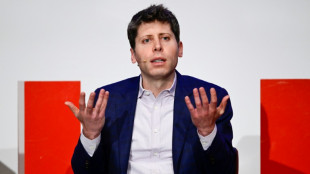
-
 Safely back on Earth, once-stranded US astronauts ready to fly again
Safely back on Earth, once-stranded US astronauts ready to fly again
-
Syria president says new authorities can't satisfy everyone
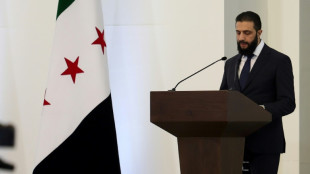
-
 US robbers who touted crime on Instagram jailed
US robbers who touted crime on Instagram jailed
-
Fernandes 'not going anywhere', says Man Utd boss Amorim


Australian black market tobacco sparks firebombings, budget hole
Sky-high tobacco prices in Australia have created a lucrative black market, analysts say, sparking a violent "tobacco war" and syphoning away billions in potential tax revenue.
Faced with a pack of 25 cigarettes costing up to Aus$50 (US$32) or more -- including Aus$1.40 in tax on each stick -- many smokers have instead turned to readily available illicit tobacco.
At the same time, authorities have cracked down on vapes, restricting legal sales to pharmacies and opening up another illegal market for people in search of affordable nicotine.
In March, the government cut its budget forecast for tobacco tax revenue in the period to 2029 by Aus$6.9 billion.
"We've got a challenge here and too many people are avoiding the excise," Treasurer Jim Chalmers conceded after revealing the figures.
He announced an extra Aus$157 million for a multi-agency force battling organised crime groups involved in the market and a string of "tobacco war" fire-bombings.
The situation was a "total disaster", said James Martin, criminology course director at Deakin University in Melbourne.
"We have taken a public health issue, smoking, and our tobacco control policies have transformed it into a multi-fronted crisis," he told AFP.
"It is a fiscal crisis, so we are losing billions and billions of dollars in tobacco tax excise but also, more concerning for me as a criminologist, it has turned into a major crime problem."
Since the start of 2023, there had been more than 220 arson attacks targeting either black-market retailers or store owners who refuse to stock illicit tobacco products, Martin said.
- Extortion and intimidation -
"This is really serious organised crime, extortion and intimidation of otherwise law-abiding citizens."
Alleged crime figures named in local media as big players include convicted heroin trafficker Kazem Hamad, who was deported to Iraq in 2023, and an infamous Melbourne crime family.
Australian Criminal Intelligence Commission chief Heather Cook said criminals fighting over the "lucrative" illegal market were associated with "violence and dangerous behaviour".
"This is impacting communities," she told Melbourne's Herald Sun in February.
Law enforcement alone could not solve the problem, Martin said.
"If we just keep making nicotine harder to get to, people are going to turn to the black market."
Australia had made two mistakes, he said: pricing legal cigarettes so high that a pack-a-day habit cost about Aus$15,000 a year and at the same time heavily restricting sales of vapes, which were predominantly sold on the black market.
"The government needs to lower the tobacco tax excise to stop the bleed to the black market, and they need to legalise consumer vaping products."
New Zealand was the only country that had successfully introduced a similar tobacco taxation policy to Australia's, Martin said.
"But they did it by legalising vaping back in 2020," he added.
"So, New Zealand used to have a higher smoking rate than we did back just four years ago. It's now substantially lower than Australia's."
Illicit cigarettes are flowing into Australia from China and the Middle East, with vapes predominantly being sourced from Shenzhen in China, the criminologist said.
- 'War on nicotine' -
And the black market still thrives despite the Australian Border Force saying it detected huge volumes of illicit tobacco in the year to June 30, 2024 -- 1.8 billion cigarettes and more than 436 tonnes of loose leaf tobacco.
Daily tobacco smoking in Australia has fallen sharply over the past decades: from 24 percent of those aged over 14 in 1991 to 8.3 percent by 2023, according to a national household survey.
But monitoring of nicotine in Australian wastewater -- whether from cigarettes, vapes, or nicotine replacement products -- showed consumption per person had remained "relatively stable" since 2016, according to the government's health and welfare institute.
Edward Jegasothy, senior lecturer in public health at the University of Sydney, said smoking rates in Australia fell just as fast during periods of sharp price increases as they did when prices were stable.
The black market had undermined government policy by providing a cheaper alternative, he told AFP.
To address the problem, authorities would probably need to lower taxes on tobacco and strengthen law enforcement, he said.
Broader nicotine restrictions in Australia had left people with fewer less harmful alternatives to tobacco, Jegasothy said.
People switching to vapes were going to the unregulated market where concentrations of nicotine and other adulterants were unknown, he said.
"So that's another risk that's unnecessarily there because of the black market."
The high tobacco tax policy also hit people in the lowest socioeconomic groups the hardest, Jegasothy said, both because they were spending a higher proportion of their incomes on it, and because they had higher rates of smoking.
Australia's "disproportionate" focus on cutting nicotine supply rather than reducing demand and harm echoed the "War on Drugs", Jegasothy argued in a joint paper with Deakin University's Martin.
"As with Australia's broader War on Drugs, there is little evidence to suggest that our de facto War on Nicotine is an optimal strategy for reducing nicotine-related harms," it warns.
D.Cunningha--AMWN